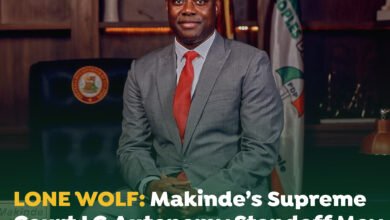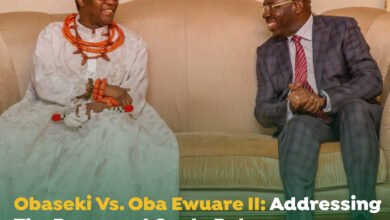Stealing Billions, Dodging Justice: The Anti-Graft War between EFCC & Ex-Governors

Governors reign supreme within their state borders for eight years at the most. Like emperors with limitless treasuries, they preside over vast budgets, wielding immense power.
They often exploit this period to enrich themselves, leaving a trail of empty coffers and unfulfilled promises. But the party doesn’t last forever.
Once their terms end, the immunity fades, and a harrowing game of cat and mouse with the Economic and Financial Crime Commission, EFCC begins.
These very individuals, who seemed untouchable during their reign, often transform into fugitives from justice the moment they leave office, desperately scrambling to escape prosecution for the crimes they committed in office.
Over the years, Nigeria’s anti-corruption war has often been described as intractable. The Jolly Nyame and Joshua Dariye’s conviction by the Economic and Financial Crime Commission in 2018 marked the most significant moment in the history of the anti-graft agency’s fight against corruption.
But the Presidential pardon extended to the former governors by former President Muhammadu Buhari in 2022 revealed the danger of confronting the monsters of public stealing, misappropriation, and diversion of public funds.
Despite challenges in securing high-profile convictions against former governors, the EFCC’s anti-graft efforts are yielding results, with an increasing number of ex-governors facing charges for criminal breach of public trust and money laundering.
White Lion: Yahaya Bello
Fortunately, the Presidential pardon granted to Jolly Nyame, a former governor of Taraba state, and Joshua Dariye, ex-Plateau state governor over N1.16 billion and N1.6 billion, respectively, hasn’t dampened the EFCC resolve.
In its latest attempt to hold a former governor to account, the agency has had a running battle with the immediate past Kogi state governor, Yahaya Bello.
Consequently, the mixed reactions that trailed the presence of EFCC operatives in his Abuja home on the 17th of April 2024, and the rascal deployment of executive power by Bello’s successor, Usman Ododo, in whisking the ex-Governor from honouring the EFCC invite underlined this distressing quandary.
For the past few months since he left office, Yahaya Bello has fought tooth and nail with the anti-graft agency. But his style has gained notoriety among the politically exposed persons.
EFCC alleged that Bello, alongside three other suspects, Ali Bello, Dauda Suleiman, and Abdulsalam Hudu, have some questions to answer in a money laundering case to the tune of N80bn. To that effect, the anti-corruption agency said it obtained a warrant of arrest to detain the former governor lawfully.
Unfortunately, the warrant hasn’t led to the former governor’s ultimate arrest. Indeed, Yahaya Bello has continued to enjoy the executive cover of his successor to dodge the unavoidable appearance of the EFCC.
‘Mai Gida of Kwara’
On the 20th of February, 2024, the EFCC detained former Kwara state governor, Abdulfatah Ahmed, aka Mai Gida, over alleged N10bn fraud.
Ahmed served as governor of the state between 2011 and 2019. A source close to the matter said the former governor was grilled and detained by the EFCC for alleged fraudulent transactions involving billions of naira that took place during his time as governor.
In 2021, Ahmed, upon invitation by the anti-graft agency was questioned by the EFCC operatives at its headquarters in Abuja concerning the diversion of funds from the treasury of the Kwara state government.
But three days after his detention, he was arraigned on a 12-count charge bordering on alleged mismanagement of public funds to the tune of a billion before Justice Evelyn Anyadike of the Federal High Court sitting in Ilorin.
Willie Obiano’
Shortly after he handed over government to Professor Charles Soludo, Willie Obiano, two terms governor of Anambra, quickly embarked on an escape trip to the US. Unfortunately, he was nabbed by the EFCC at the Murtala International Airport, Ikeja, in 2022.
However, on January 24, 2024, EFCC arraigned Willie Obiano on a nine-count charge bordering on money laundering, diversion of funds, stealing, and corruption to the tune of billions. Despite pleading not guilty, a Federal High Court in Abuja has dismissed the application of the former Anambra state governor, Willie Obiano, challenging the EFCC’s powers to prosecute him.
The court quashes and refuses to revoke charges, granting the anti-graft agency the go-ahead with the criminal trial of the ex-governor. The list of former governors in the dragnet of the EFCC appears depressing.
Fighting Corruption Is Dangerous
In her memoir titled Fighting Corruption Is Dangerous, former Minister of Finance and DG WTO, Dr. Ngozi Okonjo Iweala, revealed the trauma she endured after her mother was kidnapped for daring the people she described as the ‘oil cabals.’ Her damning account mirrored the efforts of the anti-graft agency whose concerted efforts are often thwarted and undermined by the reckless abuse of power, saboteurs within its ranks and files, and indifference of the public to its course.
More disturbing in the war against corruption is also the perennial dismissal of the successive heads of the agency.
From the pioneer Nuhu Ribadu to the only female Farida Waziri, Ibrahim Lamorde, Ibrahim Magu to Abdulrasheed Bawa, the shady sacking of the agency heads has also raised unsettling dust around the government determination to reduce the menace of corruption.
Anyway, it does appear that regardless of the sacrifices and commitments of the anti-graft czar, arbitrary dismissal continued to be their lot.
Perhaps this can equally be described as parts of corruption fighting back.
To truly win this war, a united front is crucial. The public, the government, and the EFCC must work together to dismantle the structures that enable and protect the corrupt.





